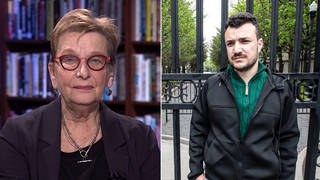HeadlinesMarch 16, 2006
Updated NSR Reaffirms Preemptive War, Singles Out Iran
The Bush administration plans to release its quadrennial National Security Strategy later today. The document reiterates the White House’s commitment to launching pre-emptive strikes against countries it decides are a threat to national security and interests. The Security Strategy places new emphasis on Iran, stating: “We may face no greater challenge from a single country than Iran. The Iranian regime sponsors terrorism; threatens Israel; seeks to thwart Middle East peace; disrupts democracy in Iraq.”
Bolton Invokes 9/11 in Iran Nuclear Comments
Meanwhile, UN Ambassador John Bolton has likened the potential threat of Iran’s nuclear program to the 9/11 attacks. In an interview with ABC News, Bolton said: “Just like September 11, only with nuclear weapons this time, that’s the threat…I think it’s just facing reality. It’s not a happy reality, but it’s reality and if you don’t deal with it, it will become even more unpleasant.”
UN Approves New Human Rights Council Over US Objections
At the United Nations, the General Assembly has voted to approve a new Human Rights Council over the objection of the United States. The body’s previous incarnation, the UN’s Human Rights Commission, had been accused of maintaining lax standards on the human rights records of its members. The new council will be smaller in size and elected by a majority of the General Assembly. The resolution received 170 votes in its favor, with only the US, Israel, the Marshall Islands and Palau opposed.
Saddam Condemns Civil Violence, Urges Attacks on Foreign Troops
In Iraq, the trial of Saddam Hussein continued Wednesday with a fiery, lengthy speech from the deposed Iraqi president. At one point, Saddam Hussein condemned the recent bombing of a Shiite shrine in Sammara and sparred with the presiding judge. Saddam Hussein went on to urge Iraqis to stop civil violence and focus armed attacks on foreign troops. After over 40 minutes of the defiant speech, the judge ordered all journalists out of the court.
US Strikes Blamed for Death of Iraqi Family Members
Meanwhile, a US military attack in the Iraqi town of Balad is being blamed for the deaths of at least a dozen members of the same family. The dead include five children and six women. The Associated Press is reporting the family’s house was flattened by an airstrike from a US helicopter. The victims were wrapped in blankets and driven to the Tikrit General Hospital. Ahmed Khalaf, the brother of one of the victims, said: “The dead family was not part of the resistance, they were women and children. The Americans have promised us a better life, but we get only death.”
Top US General in Iraq Says Bases May Be Permanent
In other news, the top US military commander in Iraq has indicated the US may want to hold on to the several military bases it has built in the country. Appearing before a Congressional subcommittee Tuesday, General John Abizaid said the US may want to keep a foothold in Iraq to support regional “moderates” and protect oil supplies.
Olmert, Abbas Spar Over Jericho Raid
The top two leaders of Israel and the Palestinians traded barbs Wednesday in the aftermath of Israel’s raid on a Jericho prison. Israeli troops stormed the prison Tuesday after British monitors were removed from guarding five Palestinians accused of murdering a former Israeli cabinet member. Interim Israeli Prime Minister Ehud Olmert said: “Once the inspectors were pulled out against the background of the international agreements–signed–which we were a partner–and the Palestinian Authority was a partner–it became inevitable that we will try and bring to justice the six suspects who were arrested in Jericho.
In Jericho, Palestinian Authority President Mahmoud Abbas toured the prison and called the raid an “unforgivable crime.” Abbas continued: “What happened without a doubt is an ugly crime which can not be forgiven and a humiliation for the Palestinian people and a clear violation of all the agreements which took place between us and them. From here we don’t only condemn but we consider this more an ugly crime which has led to what it led to. Now kidnapping Saadat and Shobaki and their brothers is illegal.”
Thousands of Ecuadorians Protest US Trade Talks
In Ecuador, protests against a proposed trade agreement with the United States continue to sweep the country. The demonstrations have grown to the tens of thousands as indigenous communities have marched from the Andes mountains to join them. Protesters are calling on the Ecuadorian government to reject a so-called free trade agreement with the US. On Wednesday, Ecuador’s Interior Minister resigned in the face of the massive protests. Just last week, over 4,000 oil-workers went on strike demanding three months back pay from Ecuador’s state-owned oil company.
Milosevic’s Body Returned To Serbia For Hometown Burial
In Serbia, the body of former leader Slobodan Milosevic returned home Wednesday. Milosevic will be buried Saturday in his hometown southeast of the capital of Belgrade.
Bush Admin. Accused of Removing Protections Against Sexual Orientation Discrimination From Security Clearance Guidelines
Here in the United States, civil rights advocates are criticizing the Bush administration over a recent change to rules allowing gays and lesbians access to national security clearances. Last year, the Bush administration quietly removed language that says sexual orientation “may not be used as a basis for or a disqualifying factor in determining a person’s eligibility for a security clearance.”
Anniversary of Rachel Corrie Killing Marked World-Wide
And today marks the three-year anniversary of the death of Rachel Corrie. The US peace activist was crushed to death by an Israeli bulldozer as she was attempting to stop the demolition of a Palestinian home in the Gaza town of Rafah. She was 23 years old. Today, people around the world are remembering her life by staging readings of her writings.
Most popular
- 1
- 2
- 3
- 4
Non-commercial news needs your support
Please do your part today.











Media Options